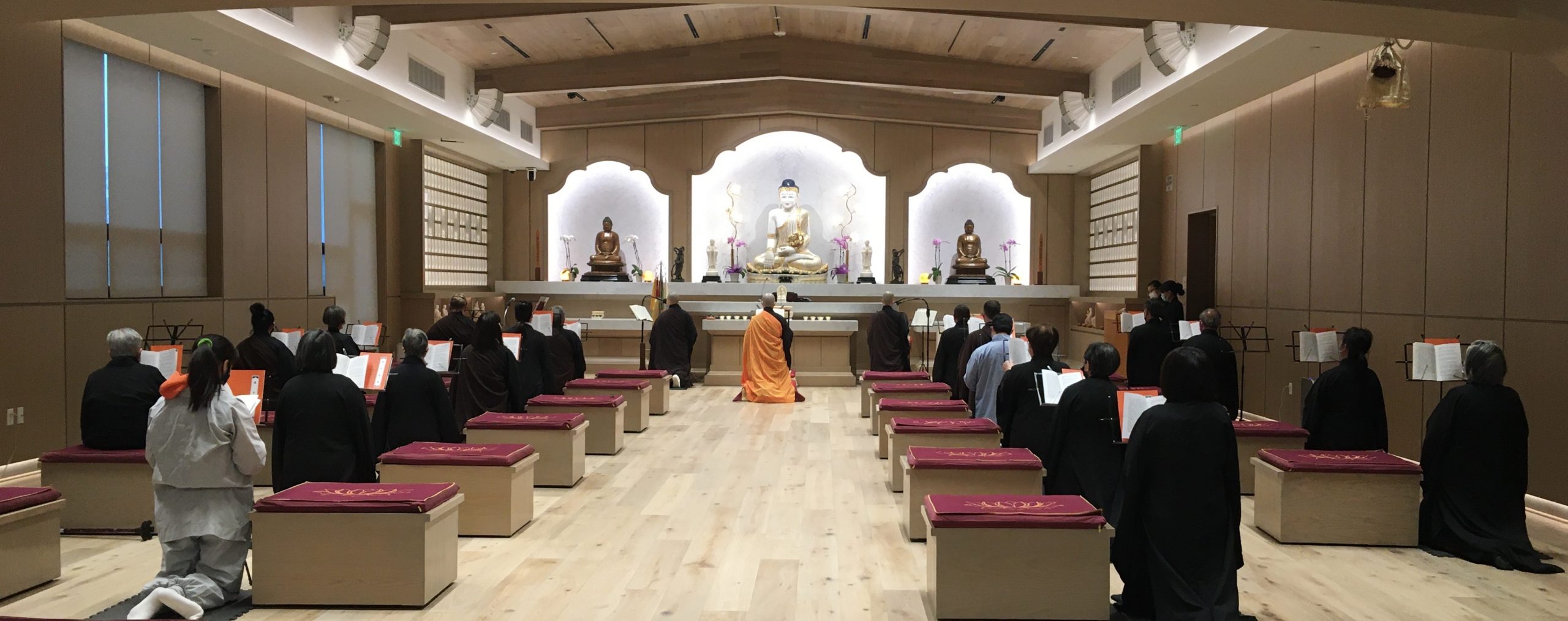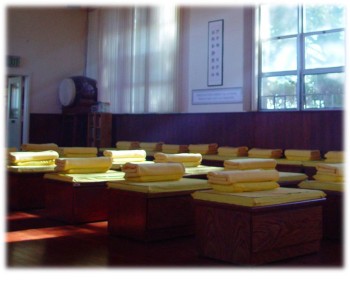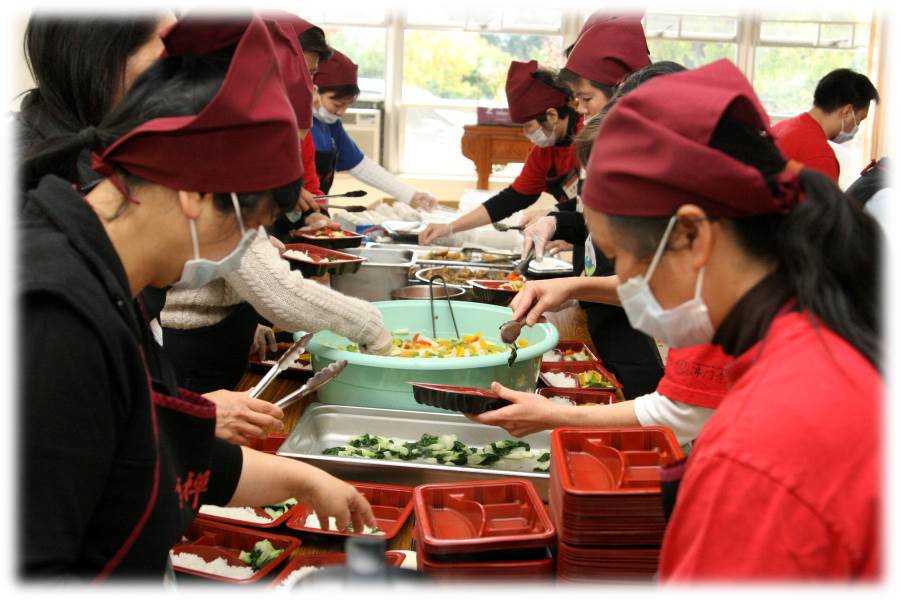Grand Master’s Dharma Talk: from the SARS Prevention Blessing Ceremony (May 15th, 2003)
Prevention is the Foremost Priority
Many people are fearful about the SARS pandemic. Therefore, Chung Tai Chan Monastery is holding this special blessing ceremony to pray and dedicate merits for the speedy end of this pandemic and for the peace and prosperity of the world.
Facing this pandemic, there are several things we can do. The foremost is prevention. There are two aspects to prevention: one is through action, the other is through the mind.
Since the outbreak of the pandemic, Chung Tai has quickly organized a prevention headquarter to implement the protective measures set forth by the government. However, solely taking physical measures is not enough; we also need to prevent the spread of infection in our mind.
Taking Prevention through Our Action and Mind
Our mind is like an epidemic area. External disease and the disease in our mind are closely related. A sutra says: “sentients and non-sentients belong to the same universal perfect wisdom.” The external physical world and our inner mind may seem like two separate worlds, but in fact they are intimately connected, sharing the same essence of life; as said in a sutra, “all earth and water are my body; all fire and wind are in my being.”
This pandemic has proven to us that we are truly interconnected and interdependent. Whether we are in China, Taiwan, Hong Kong, Europe, the southern hemisphere or northern hemisphere—we live and breathe the same air. When the air is polluted, everyone is harmed. Therefore, keeping the air fresh is everyone’s responsibility.
Prior to the pandemic, many people did not pay much attention to environmental and air pollution, thinking the pollution in your area has nothing to do with the area I live in. However, this pandemic has shown us that diseases can be spread through saliva droplets in the air, door handles, elevator buttons, and other media. Therefore, when one person dies from the infection, many more lives may have already been infected; when one person is suffering from the disease, many others are catching the same disease. This pandemic has allowed us to experience and understand how closely related we are. Therefore, we need to cherish our own life, moreover, respect everyone’s life. Everyone needs to protect the air from pollution because everyone lives in the same air. Similarly, everyone needs to take part in prevention; it is not a personal choice. If we understand this world is one community we all share, then we will appreciate the importance of pandemic prevention.
We can take effective preventive measures by drawing from the information and experience accumulated in the past. Most importantly, we must not treat the matter of prevention lightly. This is a most grave and urgent matter. This is a common disaster all people are facing, and everyone must stay alert and take precautions.
In the Buddha’s time, there were ninety-six kinds of non-Buddhist sects whose followers would secretly put poisons in the food of the Buddha and his disciples in order to harm them. Therefore, the disciples asked the Buddha how they can prevent from being poisoned. The Buddha instructed them to chant the sampragata mantra three times before having a meal or drinking water, and chant it 108 times every morning and evening.
Eradicating the Poisons from the Source
We need to prevent the spread of the pandemic through both our action and mind. Of foremost importance is to eradicate the poisons of greed, anger, and ignorance in our mind. Anger is a poison. When we are angry, our face may turn blue, yellow, or white. That’s the poisonous fire of anger. If those with heart disease or high-blood pressure get angry and explode in rage, that anger will release poisons that damage the cells in their body and may even cause a shock. Similarly, the poisons of greed and ignorance will also harm our health.
During the 15 years when the Sixth Patriarch Huineng was staying with a group of hunters, he was often asked to watch the traps, and he would release the trapped animals whenever no one was watching. One time the hunters set a fire on the mountain to force the animals to the area of the traps. However, the wind suddenly blew in the opposite direction and set the whole mountain on fire.
To save the animals, the Sixth Patriarch sat down to meditate, abiding in Middle Way Reality with not a single thought arising. Middle Way Reality is a state transcending duality, in which the external and internal are one—mountains, rivers, the earth, the sun, moon and stars are in oneness with the earth, water, fire, and wind in our body. This state will manifest when this mind is free of thought and attachment. In this state of reality, the Sixth Patriarch gave rise to this thought: “fire is not fire in itself; fire arises from our mind; if there is no fire in the mind, fire does not arise by itself.” Because there is no poisonous fire of greed, anger, and ignorance in the Sixth Patriarch’s mind, the forest fire naturally extinguished.
Working Together to Turn Obstacles into Opportunities and Blessings
All phenomena are in our mind. During this SARS pandemic, we need to practice proper hygiene, keep our body healthy, and avoid crowed public places and places prone to the spread of the disease. Furthermore, we should examine our mind and check if it is infected with greed, anger, and ignorance. If so, immediately repent and make amends; this is the way to dispel the poisons in our mind.
In practice, we wear a mask, wash our hands frequently, or even put on protective gears to prevent the infection. However, this is not enough. We have to purge the poisons in the mind through reflection, repenting and correcting our own wrongs, and maintaining a mind of equality, stillness, compassion, joy, and virtue. This way, our mind will be full of brightness, and a mind of brightness is a pure land. When our mind is not attuned to the world of disease and infection, we will naturally be free from the pandemic.
In Buddhist cultivation, it is not enough to work on the various practices and rituals; we need to work on our mind as well. If we have not reached the level in which our pure mind, our mind of compassion, equality and non-attachment is present every moment, then at least we should let our mind abide in wholesome thoughts every moment. Keep our mind on the Buddha, the Dharma, the Sangha, the precepts, charity, or the heavens. When our mind is abiding in the Dharma and good thoughts, then we will not be attuned to the vibes of the disease.
However, if you really cannot keep your mind on positive thoughts, then the last recourse is to pray for the blessing of the Three Jewels, to chant the sutras and mantras, or to carry the Disaster-Removing and Blessing Mantra pendant with you. Although these practices are based on religious faith and sentiment, Buddhism also teaches that:
“When we are sincere, the buddhas will respond.”
“Things do not arise by themselves, they need specific conditions to manifest. The Way is not illusive, it will be realized when the right conditions are met.”
If we understand all things arise from conditions, then we will be able to turn misfortune and obstacles into opportunities and blessing any time.
“Things do not arise by themselves”: Just Like today, we can be here for this blessing ceremony because all the necessary conditions for this event have come together. With the strength and power of the Three Jewels, the inherent virtue of our true nature, as well as the power of our vows, this ceremony will then generate positive influence and effect. When we all share this understanding, when all the positive conditions are present, then together we will achieve inconceivable virtue and merit.
Getting Through Misfortune by Right Mindfulness and Compassion
Today, everyone is sincerely and respectfully attending this ceremony. Shifu hopes you will bring this mind of sincerity, respect, compassion, as well as equality, modesty, and softness—all these good thoughts back to your family and work place, then you can prevent the spread of the pandemic everywhere, which is the goal of this ceremony.
Buddhism is based on equality:
“Great is the kindness that is unconditioned; great is the compassion when all are one.”
“I seek not comfort and pleasure for myself; I seek only to liberate all sentient beings from suffering.”
“When sentient beings are joyful, the buddhas are also joyful.”
Abiding by these vows and thoughts, our mind will enter the realm of the bodhisattvas, which is beyond the harm of SARS and other diseases. This is the meaning and goal of this peace and blessing ceremony. Finally, may all of us be blessed with good health, peace and happiness.





 A long time ago, there was a farmer who had a big wheat farm and he planted lots of wheat. He saw his neighbor grow wheat on the neighboring farm; they grew very well and very big. He asked his neighbor, “Look at the wheat on your farm! How did you make it grow so well? Is there a secret to planting wheat and having it grow well?”
A long time ago, there was a farmer who had a big wheat farm and he planted lots of wheat. He saw his neighbor grow wheat on the neighboring farm; they grew very well and very big. He asked his neighbor, “Look at the wheat on your farm! How did you make it grow so well? Is there a secret to planting wheat and having it grow well?”




